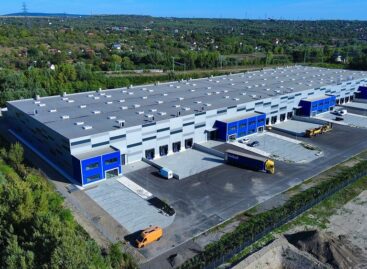Budapest Ranked 5th Most Popular Logistics Location In CEE
Prologis, Inc., the global leader in industrial real estate, today announced the launch of a new research, revealing the top logistics locations in Central and Eastern Europe for occupiers. Budapest is ranked 5th in the region, and improved its position by four places to 15th in the top 100 of European markets since 2013.
The top five locations are spread over the region with each one in a different country, reflecting the expansion of the logistics sector in CEE over recent years. Central Poland, which includes Lodz, is CEE’s most desirable location, followed by Istanbul in Turkey, Prague in the Czech Republic, Bucharest in Romania and Budapest in Hungary.
The findings form part of a wider report, Logistics Real Estate Network Expansion, which was carried out by Prologis, in partnership with Eyefortransport.
CEE shows the biggest improvement among locations from the first report in 2013, with nine of the top 10 CEE markets improving their score. In total, eight CEE locations made it into the top 20, compared to four in 2013.
Low cost is the major factor for CEE – markets in CEE dominated the rankings in the “cost of labour” and “real estate costs” criteria. Of the top 10 European locations in the criterion “cost of labour”, eight are located in CEE. And of the top 20 best locations with regard to “cost of real estate”, 13 are located in CEE.
The rise of markets in CEE is at the expense of markets in Western Europe. Markets showing the biggest declines in their ranking are Liege, Paris, Brussels, Madrid and Central Germany. Air cargo hubs, like Frankfurt and Amsterdam-Schiphol, lost ground as well. According to the report, this is due to lower scores for the location drivers “labour availability” and “cost of labour”.
Venlo, a logistics market in south east Netherlands, near the German border, is Europe’s most desirable location by a significant margin, as it was when the research was carried out for the first time in 2013. Venlo came out top in nine of the 11 location criteria, scoring particularly high for ‘availability of land’, ‘road access, ‘transport cost’ and ‘regulatory’.
In second place is Rotterdam, the major port in the west Netherlands, in third the Antwerp-Brussels area in Belgium, followed by Central Brabant and East Brabant in south Netherlands.
Making up the top 10 locations behind the five Benelux powerhouses are the German city of Dusseldorf, Central Poland, Antwerp-Hasselt, Istanbul and Cologne.
The Logistics Real Estate Network Expansion report answers the key location questions facing owners and occupiers of logistics property at a time of huge structural change. The reconfiguration of the European supply chain and the rise of e-commerce means there is significant demand potential for modern, efficient distribution facilities across the region.
A total of 216 occupiers of logistics property from a variety of sectors, ranging from retail to automotive to pharmaceuticals, ranked 100 distribution locations by 11 criteria:
Occupiers favour closeness to economic networks, low costs (both transport and real estate costs) and an availability of skilled labour.
In the future, availability of staff will be the most important consideration for choice of location. However, the importance of staff availability differs significantly per country and region. In general, it is most important in north western Europe and the U.K. and of less importance in the European periphery. However, across Europe it remains a challenge to find qualified and experienced staff.
Factors, such as global trade, outsourcing and infrastructural improvements, appear poised to be stronger drivers of change than cyclical factors, such as economic development and consumption. Two categories that were relatively unimportant in the 2013 report are now much more important: sustainability and planning for e-commerce. Sustainability has become particularly important for brand-sensitive customers, such as retailers and consumer packaged goods distributors. E-commerce growth has exploded in recent years and is only likely to become more important.
László Kemenes, senior vice president and country manager for Prologis in Hungary said: “The research is of vital importance as it helps our understanding of customers’ current and future distribution requirements in the consolidating Hungarian market. We are glad that the country improved in the ranking in the last three years, however we see many opportunities to grow in the CEE market.
“Logistics companies are constantly optimising their distribution strategies to ensure the highest service levels for the lowest costs. The European market is driven by long term trends, such as proximity to economic networks, sourcing staffing and consolidation. Logistics corridors like Budapest and infill locations in the largest metropolitan areas are expected to benefit most from this.
“The results demonstrate that we are well placed
Related news
Record investments, new growth paths – Hungary will be present as an attractive investment destination at MIPIM
🎧 Hallgasd a cikket: Lejátszás Szünet Folytatás Leállítás Nyelv: Auto…
Read more >Waberer’s will replace around 1,000 devices in its vehicle fleet this year
🎧 Hallgasd a cikket: Lejátszás Szünet Folytatás Leállítás Nyelv: Auto…
Read more >Related news
Change in Rossmann Hungary’s leadership: Kornél Németh decided to move towards new challenges in 2026
🎧 Hallgasd a cikket: Lejátszás Szünet Folytatás Leállítás Nyelv: Auto…
Read more >Wizz Air systems will be temporarily down for scheduled maintenance mid-week
🎧 Hallgasd a cikket: Lejátszás Szünet Folytatás Leállítás Nyelv: Auto…
Read more >









